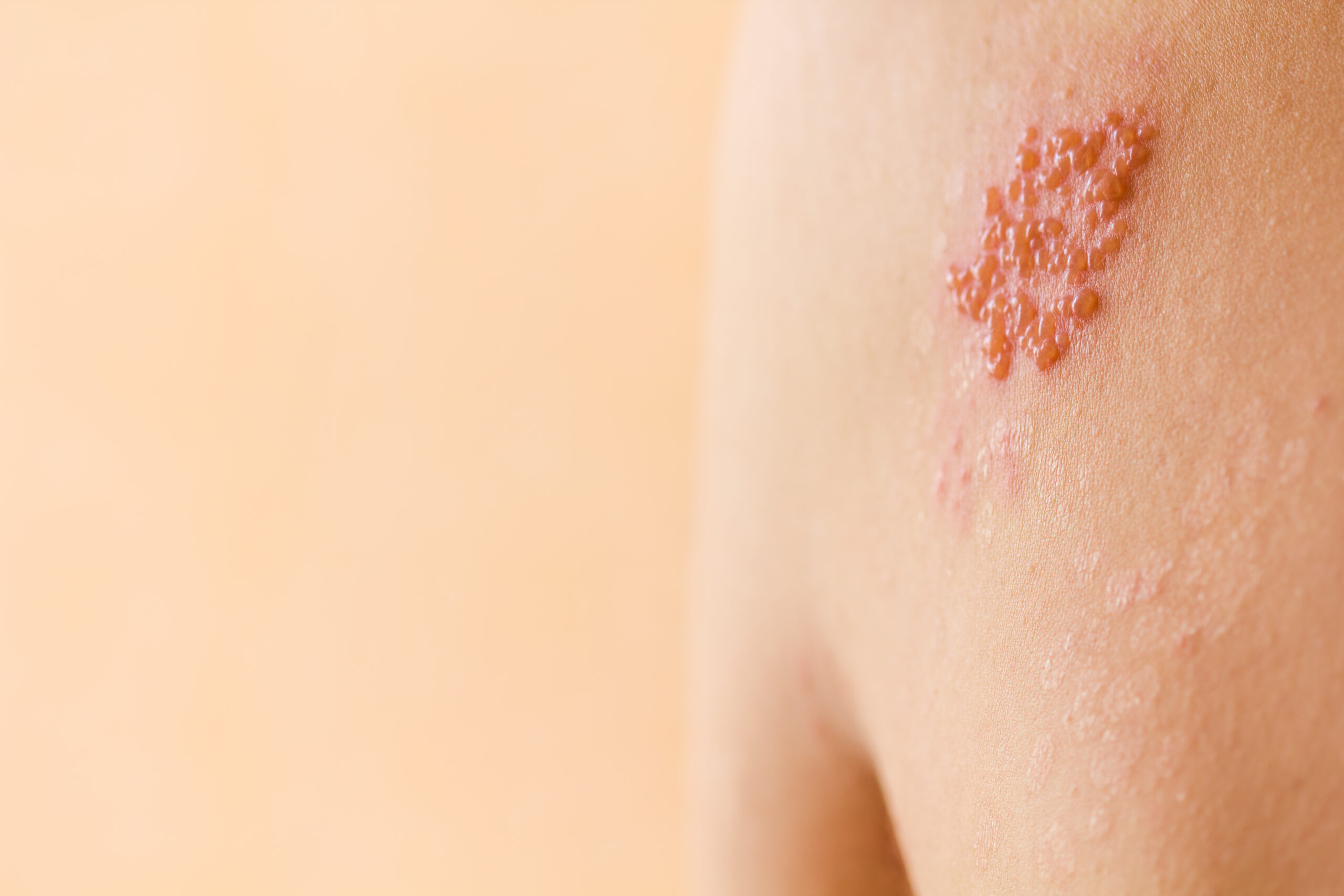What should we know about Shingles?
Dr. Pongsak Boonyaleephun, Assistant Hospital Director of Bangkok Hospital Hua Hin and our physician at Health Promotion Center shares that shingles or Herpes zoster is caused by chickenpox virus or varicella which have been hiding in our body for years after having chickenpox when we were young. The infection occurs when the viruses come out from the hiding place and travel along the nerve root to the skin, which happens when our immunity is weakened. Additionally, there are viruses present in the blisters which can spread to others by contact. If that person has never had chickenpox before, if contacting, he or she may develop chickenpox, not shingles.
 Before the rashes appear, the patient may experience symptoms such as low-grade fever and more commonly, burning pain or itchy tingling sensation on the affected skin. The symptoms may proceed the rashes for days or weeks. There are phases of rash development starting from small group of redness of the skin which turn to groups of blisters after two or three days. The blisters will then become dry, forming scabs covering the whole rashes. During the rash period, the pain is prominent with burning and itches. The rashes often start from area in the back then spread to the side and the front. The rashes always involve one side of the body. The affected skin will scar which may fade after months. For patients with low immunity conditions such as AIDS, leukemia or patients receiving chemotherapy, the rash can be on both sides but very rare.
The most annoying thing after having Herpes zoster is that even the skin lesions have disappeared, the pain still remains. This condition is called post-herpetic neuralgia and it is commonly found in people over the age of 50. The pain and discomfort may last for months or years even and some patients require further treatments to manage this discomfort.
Before the rashes appear, the patient may experience symptoms such as low-grade fever and more commonly, burning pain or itchy tingling sensation on the affected skin. The symptoms may proceed the rashes for days or weeks. There are phases of rash development starting from small group of redness of the skin which turn to groups of blisters after two or three days. The blisters will then become dry, forming scabs covering the whole rashes. During the rash period, the pain is prominent with burning and itches. The rashes often start from area in the back then spread to the side and the front. The rashes always involve one side of the body. The affected skin will scar which may fade after months. For patients with low immunity conditions such as AIDS, leukemia or patients receiving chemotherapy, the rash can be on both sides but very rare.
The most annoying thing after having Herpes zoster is that even the skin lesions have disappeared, the pain still remains. This condition is called post-herpetic neuralgia and it is commonly found in people over the age of 50. The pain and discomfort may last for months or years even and some patients require further treatments to manage this discomfort.
 Treatment
Treatment
 Complications of shingles
Complications of shingles
 How to prevent shingles
The simple words will be keep your good health by eat good food, exercise and rest sufficiently. Avoid rash contact in patients with shingles especially ones who have not had chickenpox and for the elderly, vaccination against shingles is recommended. Vaccinated people can still develop shingles but it will be much milder, recover faster and a lot less complications.
“If you see clear blisters appearing on any part of your skin or you have a burning sensation without any rashes which you cannot explain, it is advisable to seek medical attention. And it is recommended to get vaccinated against shingles to help reduce the severity of the disease,“ Dr. Pongsak concluded.
**************************************************************************
For more information and booking an appointment, please contact :
Tel. 032-616-800 Call Center, Bangkok Hospital Hua Hin
📣 News & Promotions: Shingrix – Shingles Vaccine, please contact Line ID: @bangkokhuahin
How to prevent shingles
The simple words will be keep your good health by eat good food, exercise and rest sufficiently. Avoid rash contact in patients with shingles especially ones who have not had chickenpox and for the elderly, vaccination against shingles is recommended. Vaccinated people can still develop shingles but it will be much milder, recover faster and a lot less complications.
“If you see clear blisters appearing on any part of your skin or you have a burning sensation without any rashes which you cannot explain, it is advisable to seek medical attention. And it is recommended to get vaccinated against shingles to help reduce the severity of the disease,“ Dr. Pongsak concluded.
**************************************************************************
For more information and booking an appointment, please contact :
Tel. 032-616-800 Call Center, Bangkok Hospital Hua Hin
📣 News & Promotions: Shingrix – Shingles Vaccine, please contact Line ID: @bangkokhuahin
 Before the rashes appear, the patient may experience symptoms such as low-grade fever and more commonly, burning pain or itchy tingling sensation on the affected skin. The symptoms may proceed the rashes for days or weeks. There are phases of rash development starting from small group of redness of the skin which turn to groups of blisters after two or three days. The blisters will then become dry, forming scabs covering the whole rashes. During the rash period, the pain is prominent with burning and itches. The rashes often start from area in the back then spread to the side and the front. The rashes always involve one side of the body. The affected skin will scar which may fade after months. For patients with low immunity conditions such as AIDS, leukemia or patients receiving chemotherapy, the rash can be on both sides but very rare.
The most annoying thing after having Herpes zoster is that even the skin lesions have disappeared, the pain still remains. This condition is called post-herpetic neuralgia and it is commonly found in people over the age of 50. The pain and discomfort may last for months or years even and some patients require further treatments to manage this discomfort.
Before the rashes appear, the patient may experience symptoms such as low-grade fever and more commonly, burning pain or itchy tingling sensation on the affected skin. The symptoms may proceed the rashes for days or weeks. There are phases of rash development starting from small group of redness of the skin which turn to groups of blisters after two or three days. The blisters will then become dry, forming scabs covering the whole rashes. During the rash period, the pain is prominent with burning and itches. The rashes often start from area in the back then spread to the side and the front. The rashes always involve one side of the body. The affected skin will scar which may fade after months. For patients with low immunity conditions such as AIDS, leukemia or patients receiving chemotherapy, the rash can be on both sides but very rare.
The most annoying thing after having Herpes zoster is that even the skin lesions have disappeared, the pain still remains. This condition is called post-herpetic neuralgia and it is commonly found in people over the age of 50. The pain and discomfort may last for months or years even and some patients require further treatments to manage this discomfort.
 Treatment
Treatment
- For patients over 50 years old or shingles in the face or with severe pain, the doctor will give oral antiviral medication preferably within 2-3 days after rashes start. The medications will reduce the severity and promote healing process and to help reduce the post herpetic neuralgia.
- For patients with low immunity, such as patient with AIDS or cancer metastasis, the doctor may give you intravenous antiviral medications with hospitalization.
- For patients with shingles in the eyes, treatment should be managed by an ophthalmologist, who will give you antiviral medications and eye drops or intravenous form.However, the antiviral medication may not get rid of the virus completely, but will reduce the inflammation and corner the virus back to their hiding places. It means that shingles may recur. Early detection and early treatments are the clues of treatment to get the best possible results.
- In the clear blister phase, treat the wound thoroughly using a clean gauze with warm saline or 3% boric acid and cover the lesions for 10-15 minutes. The dressing should be repeated 3-4 times per day.
- In case the blisters rupture, the lesions should be washed with clean saline and covered with gauze pieces.
- Painkillers can be used if necessary.
- Avoid picking the wounds as this may cause bacterial infection and causing scars.
- Do not apply topical herbal remedies directly on the wounds as this may cause bacterial infection.
 Complications of shingles
Complications of shingles
- Bacterial infection due to scratching or improper care of rashes. This causes the wounds to heal slowly and scarring.
- In case shingles appear in the eyes, it may leave permanent conditions related to corneal inflammation, glaucoma and vision impairment.
- In cases of shingles developed in the ear, paralysis in the cranial nerve may occur and sometimes cause vertigo or dizziness and facial palsy, the condition that half of the facial muscles are paralyzed.
- In people with low immunity, the disease may be systemic and involve the brain and internal organs. This can be fatal.
- Pregnant women with shingles may affect the fetus causing abnormalities such as body scarring, limb atrophy, small head and brain problems.
 How to prevent shingles
The simple words will be keep your good health by eat good food, exercise and rest sufficiently. Avoid rash contact in patients with shingles especially ones who have not had chickenpox and for the elderly, vaccination against shingles is recommended. Vaccinated people can still develop shingles but it will be much milder, recover faster and a lot less complications.
“If you see clear blisters appearing on any part of your skin or you have a burning sensation without any rashes which you cannot explain, it is advisable to seek medical attention. And it is recommended to get vaccinated against shingles to help reduce the severity of the disease,“ Dr. Pongsak concluded.
**************************************************************************
For more information and booking an appointment, please contact :
Tel. 032-616-800 Call Center, Bangkok Hospital Hua Hin
📣 News & Promotions: Shingrix – Shingles Vaccine, please contact Line ID: @bangkokhuahin
How to prevent shingles
The simple words will be keep your good health by eat good food, exercise and rest sufficiently. Avoid rash contact in patients with shingles especially ones who have not had chickenpox and for the elderly, vaccination against shingles is recommended. Vaccinated people can still develop shingles but it will be much milder, recover faster and a lot less complications.
“If you see clear blisters appearing on any part of your skin or you have a burning sensation without any rashes which you cannot explain, it is advisable to seek medical attention. And it is recommended to get vaccinated against shingles to help reduce the severity of the disease,“ Dr. Pongsak concluded.
**************************************************************************
For more information and booking an appointment, please contact :
Tel. 032-616-800 Call Center, Bangkok Hospital Hua Hin
📣 News & Promotions: Shingrix – Shingles Vaccine, please contact Line ID: @bangkokhuahin